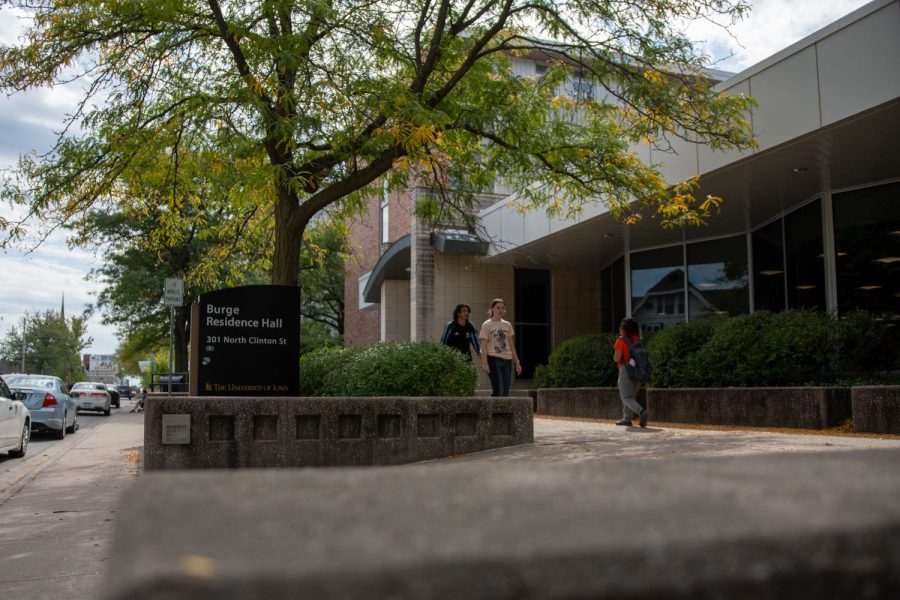UI students worry about high costs of living, tuition increases
Despite an anticipated downward trend, UI students are seeing higher costs of education and basic goods because of high inflation rates.
Burge Residence hall in Iowa City Iowa on Wednesday, Sept. 21, 2022.
September 27, 2022
The reality of rising costs and debt is all too familiar for University of Iowa fourth-year student Jarod Valencia-Cheng, who has paid out-of-state tuition ever since they moved from Maryland to Iowa City to study creative writing.
“Every year I have watched those tuition fees go up and up,” Valencia-Cheng said. “I pay about $43,000 [for tuition], not including the benefits I get from work.”
In April, the state Board of Regents approved a 3 percent increase to resident hall rates and meal plans for the 2022-23 academic year. Tuition at the UI also jumped 4.25 percent in July with unanimous approval from the regents. The Consumer Price Index also released new inflation data on Sept. 13, reporting an 8.3 percent increase in inflation in August.
Valencia-Cheng said most of their tuition was paid for in private loans starting from freshman year up until this past school year as well as federal loans with the Free Application for Federal Student Aid.
“There are no scholarships that are set aside in the English department for students of color that are from outside the state of Iowa, and the same goes for queer, trans students,” Valencia-Cheng said.
After years of searching for scholarships to afford their education, Valencia-Cheng turned toward working to help pay for tuition.
“I’m constantly working,” they said. “I’ve applied to at least five or six jobs in the past three or so months, and usually I get rejected or places just don’t call back.”
Although they described growing up comfortably in a two-income home, attending college 900 miles away put a financial strain on Valencia-Cheng. Last year, their dad suffered complete liver failure and partial kidney failure that left him in a medically induced coma.
“I felt so much shame, being far away, getting an education, and not taking care of him,” they said. “I was sending money back from my paycheck to my mom so she could pay for the house bills.”
Meanwhile in Iowa City, the costs of living continue to rise.
“I’ll even start going out of my way sometimes to find gas stations with less money,” they said. “And I still have to put it on the credit card because I just can’t afford it.”
Valencia-Cheng hopes to go to graduate school with a Master of Fine Arts in creative writing, but because of financial obstacles, the future remains uncertain.
“Every other day it’s like, do I drop out? But I’m scared of dropping out,” they said. “I’m scared that they’ll have to kick me out of the university because I just can’t pay.”
Despite the 4.25 percent increase in tuition, the regents reported in this year’s Annual Student Financial Aid Report that need-based scholarships and grants awarded to undergraduates decreased by 2 percent at regent universities. Other areas of aid changed as well:
- Externally sourced need-based scholarships declined by 7.3 percent.
- Of the 76.4 percent of residential UI students with financial needs, 56 percent of students had their needs met.
- Of the 62.1 percent of non-residential students with financial needs, 52 percent had their needs met.
- 55 percent of UI students graduate with debt – the highest percentage of all three public state universities.
First-year student Hannah Williams said she faced the decision to possibly withdraw her application from the UI when tuition rates increased.
With two older brothers in college as well, Williams wrote in an email to The Daily Iowan that her parents could not afford to pay for her college education despite the FAFSA estimated family contribution.
“I had called the school and asked if there was any more aid that they could give me, but they said that all FAFSA offers were final, and could not be changed,” she wrote.
Williams wrote she was not planning on working during her first semester of college but quickly realized that she had to if she wanted to pay her college tuition.
“I needed some sort of income to at least help me stay afloat,” she wrote.
Extra spending is now extremely tight for Williams, as she is now looking for employment opportunities in the area.
“Economic conditions usually determine the lifestyle of not just working adults, but young [people] in college as well,” she wrote. “I ended up still coming to Iowa, but with the responsibility of having to take out more student loans.”















